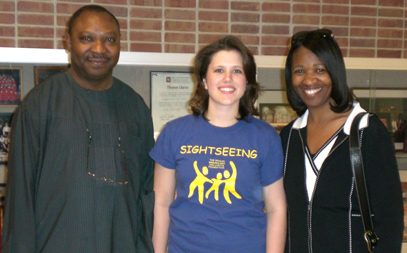 |
| Teenage uveitis patient and fundraiser extraordinaire
April Walker (c) is flanked by NEI clinical trial coordinator Dominic Obiyor and principal investigator
Dr. Grace Levy-Clarke. |
April Walker, 18, has battled an eye disease called uveitis for the past 7 years. But she hasn’t let that slow her down. She has raised more than $10,000 for the Ocular Immunology and Uveitis Foundation by organizing a fashion show and raffle at Susquehannock High School in Glen Rock, Pa., from which she recently graduated.
She has also established a local support group for people with uveitis.
Uveitis is a condition in which the eye’s pigmented
middle layer—the uvea—becomes inflamed. The causes vary, but in most cases the body’s immune system attacks the eye, causing
sight-threatening inflammation. Childhood
uveitis accounts for 5 to 10 percent of all patients with uveitis. The most common type of non-infectious childhood uveitis associated
with a systemic disease is juvenile arthritis-associated chronic uveitis, of unknown cause, that occurs in the front part of the eye. Therapies
for childhood uveitis are often challenging.
Since October 2006, Walker has been in an NIH clinical trial for the treatment of uveitis associated
with juvenile arthritis. Participants come to the Clinical Center once a month for a year to receive intravenous infusions of an immune-therapy drug called daclizumab. The principal investigator, NEI’s Dr. Grace Levy-Clarke, said, “I am very pleased with the preliminary results.”
Previous NEI research discovered that, in uveitis, T helper cells—a type of white blood cell that normally helps fight harmful bacteria
and viruses—cause an immune response in the eye. They then found that the helper cells that attack the eye have large numbers of interleukin-2 receptors on their surface. Interleukin-
2 is a hormone that helps the body respond to infection. The IL-2 receptor activates
the helper cell and acts like an alarm bell to recruit other immune cells into the eye, causing inflammation.
Daclizumab, a type of human antibody cloned from a white blood cell, blocks IL-2 receptors
and prevents the immune response triggered
by helper cells. Pilot studies with adult patients suggest that, in most cases, daclizumab
may effectively replace other medications that suppress the immune system. NEI’s experience
with it began in the mid-1990s with Dr. Robert Nussenblatt, chief of the Laboratory of Immunology.
Walker has been treated with other therapies,
but none has been effective in controlling her uveitis. About daclizumab, she says, “This is the first time in 7 years I have found a medication that successfully treats my condition
without side effects.” Some therapies can cause kidney dysfunction, glaucoma, osteoporosis,
increased blood sugar, high blood pressure
and weight gain.
In addition to holding fundraisers, Walker gives interviews and speeches about uveitis. She has been interviewed by local newspapers, and on radio and TV. The ongoing effort to “get the word out,” she says, is her “coping method.”
Walker enters Shippensburg University this fall to major in elementary education. Eventually,
she would like to do public relations work for a nonprofit organization. If she does, she will have plenty of experience. In addition to her recent fundraising, she volunteered for several
years with the Arthritis Foundation. She is considering making the fashion show an annual event to benefit uveitis research. 